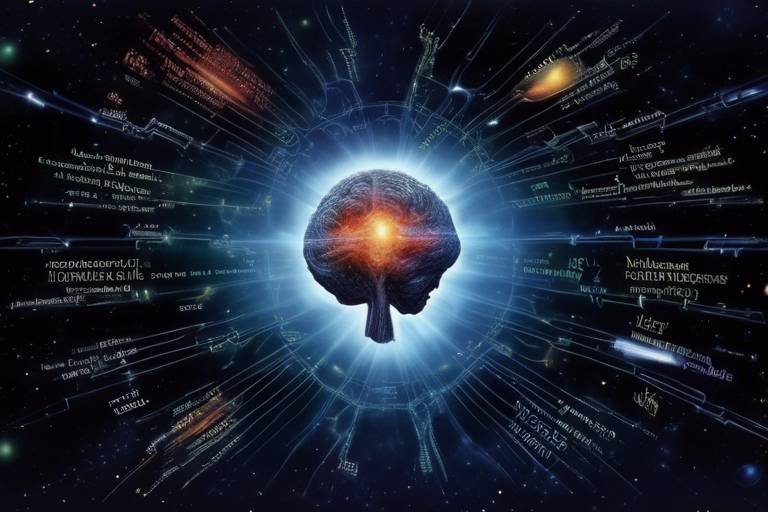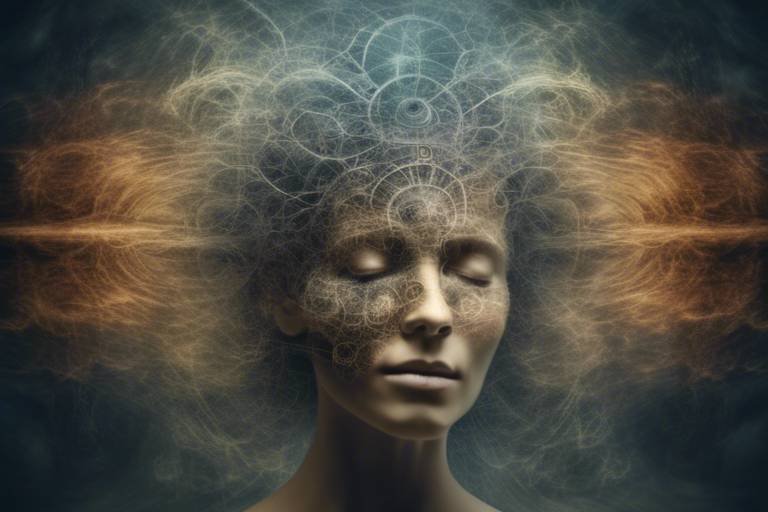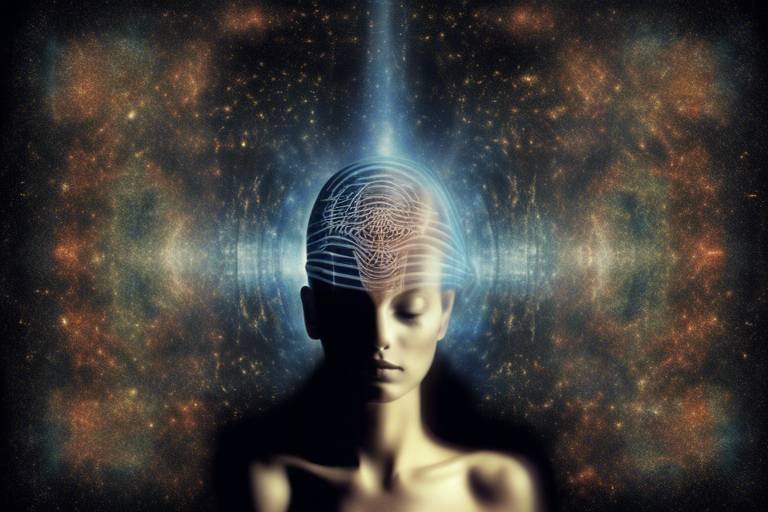The Intriguing World of Consciousness Studies
Welcome to the captivating realm of consciousness studies, where the very essence of what it means to be human is explored in depth. Imagine for a moment, if you will, that your mind is like a vast ocean, teeming with life and mystery. Just beneath the surface, countless questions swirl around: What is consciousness? How does it shape our experiences? And what does it mean for our understanding of reality? This article aims to peel back the layers of this complex phenomenon, revealing the intricate tapestry of theories, definitions, and implications that consciousness studies entail.
At its core, consciousness is often described as our awareness of ourselves and the world around us. But let’s not be fooled by such a simplistic definition! Consciousness is multifaceted, encompassing everything from basic sensory perceptions to profound self-reflection. It’s like a kaleidoscope, where each twist reveals a new pattern, a new understanding of human cognition and experience. As we dive deeper into this exploration, we will encounter various perspectives that have emerged over centuries, each adding its own unique color to the picture.
Throughout this journey, we will traverse the landscapes of different theories that attempt to explain consciousness. From the age-old debates of dualism versus materialism to the more contemporary views of panpsychism, each theory presents its own narrative about the nature of consciousness. Think of these theories as different lenses through which we can examine the same starry sky of human experience. Each lens brings into focus different aspects of consciousness, and together, they help us build a more comprehensive understanding of who we are.
But why should we care about consciousness studies? Well, understanding consciousness can have profound implications for various fields, including psychology, neuroscience, and even artificial intelligence. As we begin to unravel the mysteries of consciousness, we open doors to new therapeutic practices that can enhance mental health, improve interpersonal relationships, and even influence our philosophical views on existence. It’s like discovering a new dimension of reality—one that not only enriches our understanding of ourselves but also our interactions with others and the world at large.
So, buckle up as we embark on this fascinating journey into the depths of consciousness studies. Together, we will explore its definitions, dissect its theories, and ponder its implications for our understanding of what it truly means to be aware. Are you ready to dive into the ocean of consciousness? Let’s get started!
- What is consciousness?
Consciousness is the state of being aware of and able to think about one's own existence, thoughts, and surroundings. - Why is consciousness important?
Understanding consciousness can lead to insights in psychology, neuroscience, and even influence how we approach mental health. - What are the main theories of consciousness?
The key theories include dualism, materialism, and panpsychism, each offering a different perspective on the nature of consciousness. - How does self-awareness relate to consciousness?
Self-awareness is a critical component of consciousness, influencing our identity and personal experiences.

Defining Consciousness
Understanding what consciousness truly means is essential for delving into the intricate tapestry of human experience. At its core, consciousness can be described as the state of being aware of and able to think about one’s own existence, thoughts, and surroundings. But wait, isn't it fascinating that this seemingly simple definition opens up a Pandora's box of questions? What does it really mean to be aware? Are we all experiencing consciousness in the same way? These questions lead us to explore various definitions and perspectives that shape our comprehension of this complex phenomenon.
Philosophers, scientists, and psychologists have grappled with the concept of consciousness for centuries, each bringing their own lens to the table. For instance, some define consciousness as a stream of thoughts or a continuous flow of awareness, while others emphasize its role in self-reflection and decision-making. The diversity in definitions reflects the multifaceted nature of consciousness itself.
Let’s break down some of the prominent definitions that have emerged over time:
- Phenomenal Consciousness: This refers to the subjective experience of being aware. It's the 'what it's like' aspect of consciousness, encompassing sensations, feelings, and perceptions.
- Access Consciousness: This is about the information that is available for verbal report, reasoning, and guiding behavior. It’s the conscious thoughts we can articulate.
- Self-Consciousness: This involves an awareness of oneself as an individual, distinct from others and the environment. It’s where self-reflection kicks in.
Each of these definitions sheds light on different aspects of consciousness, but they also raise further questions. For instance, how do these types of consciousness interact? Is one more fundamental than the others? The exploration of such questions can lead to a deeper understanding of what it means to be human.
Moreover, the implications of defining consciousness extend beyond mere academic inquiry. They touch on practical matters, such as ethics in artificial intelligence, the nature of personal identity, and even the legal system. If we can define consciousness, we might also determine who or what deserves rights and protections.
In conclusion, defining consciousness is not just an academic exercise; it is a gateway into understanding the very essence of human experience. As we continue to explore this captivating subject, we must remain open to the myriad of perspectives that contribute to our understanding of consciousness. After all, the more we learn, the more we realize how much we still don't know!

Theories of Consciousness
When it comes to understanding consciousness, there are numerous theories that attempt to explain this enigmatic phenomenon. Each theory offers a unique lens through which we can examine the intricacies of human awareness and experience. Let's dive into some of the most prominent theories, namely dualism, materialism, and panpsychism, and see how they shape our understanding of consciousness.
Dualism is perhaps one of the oldest theories in the game, famously championed by René Descartes. It posits that the mind and body are two distinct entities. Imagine a computer and its software; while they work together, they are fundamentally different. Dualists argue that mental states, such as thoughts and feelings, cannot be reduced to physical processes alone. This raises intriguing questions: If our minds are separate from our bodies, what does that mean for our identity and existence?
On the flip side, we have materialism, which takes a more grounded approach. Materialists contend that consciousness arises from physical processes in the brain. Think of it like a car engine; when all the parts work together, you get motion. Similarly, when the brain's neurons fire in specific patterns, consciousness emerges. This theory aligns well with modern neuroscience, as it seeks to uncover the biological mechanisms behind our thoughts and experiences. However, it also raises the question of whether consciousness can ever be fully understood through physical explanations alone.
To further elaborate, let's consider a comparison between dualism and materialism. In the table below, we outline some key differences:
| Theory | Key Beliefs | Implications |
|---|---|---|
| Dualism | Minds and bodies are separate entities. | Suggests a non-physical aspect of existence. |
| Materialism | Consciousness is a product of physical processes. | Focuses on neuroscience and brain activity. |
Another fascinating theory is panpsychism, which posits that consciousness is a fundamental feature of all matter. Imagine every atom and particle having a tiny bit of consciousness—it's a mind-boggling perspective! This theory suggests that consciousness is not exclusive to humans or even animals but is inherent in everything around us. Panpsychism challenges our conventional views and invites us to consider the consciousness of non-human entities and even the universe itself. What if the rocks we walk on and the trees we admire possess a form of awareness?
As we explore these theories, it's essential to recognize that each has its strengths and weaknesses. While dualism offers a compelling view of the mind-body relationship, it struggles to explain how these two interact. Materialism, on the other hand, provides a scientific framework but may overlook the subjective aspects of consciousness. Panpsychism opens up a realm of possibilities but raises questions about the nature of consciousness itself.
In conclusion, the theories of consciousness are as diverse as the experiences they aim to explain. They invite us to ponder profound questions about our existence, identity, and the nature of reality. As we continue to explore these theories, we may uncover deeper insights into what it truly means to be conscious.
- What is consciousness? Consciousness refers to the state of being aware of and able to think about one's own existence, thoughts, and surroundings.
- Why is understanding consciousness important? Understanding consciousness can provide insights into human behavior, mental health, and the nature of reality itself.
- Are there definitive answers about consciousness? Currently, there is no single theory that fully explains consciousness, making it a subject of ongoing research and debate.

Dualism vs. Materialism
When diving into the intriguing debate between dualism and materialism, we find ourselves at the crossroads of philosophy and science, grappling with the very essence of what it means to be conscious. Dualism, famously championed by philosophers like René Descartes, posits that the mind and body are distinct entities. This means that our mental states—thoughts, feelings, and experiences—are fundamentally separate from our physical bodies. Imagine your mind as a ghostly presence, floating above the physical realm, influencing it but not being part of it. This perspective raises profound questions: If the mind is separate, what happens to it after death? Is our consciousness merely a byproduct of our brain's activity, or does it exist beyond the physical world?
On the flip side, materialism takes a more grounded approach. It argues that everything about consciousness can be explained through physical processes in the brain. In other words, our thoughts, emotions, and experiences are simply the result of neural activity. Picture this as a complex machine, where every cog and wheel (or neuron and synapse) works together to produce the rich tapestry of human experience. Materialists assert that understanding the brain's workings will ultimately unlock the mysteries of consciousness. This leads us to a crucial question: If consciousness is merely a function of brain activity, what does that mean for our sense of self and free will?
The clash between these two perspectives isn't merely academic; it has real-world implications. For instance, consider the implications for mental health treatment. If one subscribes to dualism, therapeutic practices may lean towards addressing the mind in isolation from the body. In contrast, a materialist viewpoint would advocate for treatments focused on altering brain chemistry and neural pathways. This divergence can lead to significantly different approaches in psychology and psychiatry.
To further illustrate the differences between dualism and materialism, let’s take a look at the following table:
| Aspect | Dualism | Materialism |
|---|---|---|
| Definition | Mind and body are separate entities | Consciousness arises from physical processes |
| Key Proponents | René Descartes, Plato | Daniel Dennett, Patricia Churchland |
| Implications for Mental Health | Focus on mental therapy and spiritual well-being | Focus on neurobiology and medication |
| View of Consciousness | Potentially eternal and immaterial | Finite and dependent on brain function |
Ultimately, the dualism vs. materialism debate invites us to ponder the very fabric of our existence. Are we merely biological machines, or do we possess a spiritual essence that transcends our physical form? This question not only fuels academic discourse but also shapes our understanding of identity and existence in profound ways. As we explore consciousness, we find that these perspectives are not just theoretical musings; they resonate deeply with our everyday experiences, influencing everything from our interactions with others to our approach to mental health and well-being.

The Mind-Body Problem
The mind-body problem is one of those *fascinating puzzles* that has puzzled philosophers, scientists, and thinkers for centuries. Imagine trying to understand how your thoughts, feelings, and consciousness—essentially, your mind—interact with your physical body. It's like trying to figure out how a magician performs a trick. The mind seems to operate in a realm of its own, yet it undeniably influences our physical actions. This relationship raises profound questions: How does something non-physical (like thoughts) affect something physical (like brain activity)? Are they two distinct entities, or is there a deeper connection?
To break it down, let’s consider the two primary perspectives on this issue. On one hand, we have **dualism**, which argues that the mind and body are separate. Think of it as two friends who live in different cities but still manage to communicate regularly. Dualists believe that mental states are distinct from physical states. This view has its roots in the philosophy of René Descartes, who famously claimed, "I think, therefore I am." For dualists, consciousness exists independently of the physical world, suggesting that our thoughts and feelings are not just byproducts of brain activity but exist in their own right.
On the other hand, we have **materialism**, which posits that everything, including consciousness, is fundamentally physical. According to this view, our thoughts and feelings are merely the results of complex brain processes. Imagine your brain as a computer; the software (your thoughts) runs on the hardware (your brain). Materialists argue that once we understand the brain, we can understand consciousness itself. This perspective is bolstered by advances in neuroscience, which have shown correlations between brain activity and conscious experience.
The mind-body problem is not just a theoretical debate; it has real implications for how we understand ourselves and our place in the universe. For instance, if dualism is correct, it raises questions about what happens to our consciousness after death. If materialism holds true, it prompts us to consider how our thoughts can be altered through physical means, such as medication or therapy. These discussions can lead us to deeper inquiries about identity, free will, and the essence of being human.
To illustrate the complexity of this issue, let’s look at a simple comparison:
| Perspective | Key Idea | Implications |
|---|---|---|
| Dualism | Mind and body are separate entities. | Consciousness exists independently; raises questions about the afterlife. |
| Materialism | Consciousness is a product of physical processes. | Understanding the brain could lead to understanding consciousness; mental states can be altered through physical means. |
Ultimately, the mind-body problem invites us to ponder our existence in a way that is both *intriguing* and *challenging*. As we continue to explore consciousness, we may find that the answers are not black and white. Instead, they could be a beautiful spectrum of colors, reflecting the complexity of human experience. So, the next time you find yourself lost in thought, remember that you're not just pondering ideas; you're engaging in one of humanity's oldest and most profound questions.

Neuroscientific Perspectives
When we dive into the on consciousness, we unearth a fascinating realm where biology meets the mind. Imagine your brain as a complex orchestra, where each neuron plays its part in a symphony of thought, feeling, and awareness. Neuroscience seeks to unravel how these biological processes give rise to the rich tapestry of conscious experience. Researchers employ advanced imaging techniques, such as fMRI and EEG, to observe brain activity in real-time, shedding light on how different regions of the brain contribute to various aspects of consciousness.
One of the most intriguing findings is the correlation between specific brain activities and conscious experiences. For instance, when you see a vibrant sunset, certain areas of your brain light up, reflecting your emotional and sensory engagement with the scene. This raises a compelling question: does consciousness arise from localized brain activity, or is it a more distributed phenomenon? Neuroscientists are still grappling with this mystery.
The implications of these findings extend beyond mere curiosity. Understanding the biological underpinnings of consciousness can significantly impact fields such as psychology, medicine, and even artificial intelligence. For example, insights into how consciousness operates can enhance therapeutic approaches for mental health conditions, guiding treatments that aim to restore or improve conscious awareness. Moreover, as we explore the neural correlates of consciousness, we inch closer to answering profound philosophical questions about the nature of self and existence.
To illustrate the relationship between brain function and conscious experience, consider the following table that outlines key brain regions associated with specific conscious experiences:
| Brain Region | Associated Conscious Experience |
|---|---|
| Prefrontal Cortex | Decision-making and self-reflection |
| Occipital Lobe | Visual perception |
| Temporal Lobe | Auditory processing and memory |
| Amygdala | Emotional responses |
This table highlights just a fraction of the intricate connections between our brain's architecture and our conscious experiences. As we continue to investigate these relationships, the potential for breakthroughs in understanding consciousness expands exponentially. Imagine the day when we can not only describe what consciousness is but also manipulate it through targeted interventions in the brain. This is not just science fiction; it's a horizon that neuroscience is steadily approaching.
In summary, the neuroscientific perspectives on consciousness offer a thrilling glimpse into how our brains create the experiences that define us. Each discovery brings us closer to understanding the essence of what it means to be aware and to exist. As we explore these frontiers, we must remain open to the mysteries that lie ahead, for consciousness is as much about the questions it raises as it is about the answers we seek.
- What is consciousness? Consciousness refers to the state of being aware of and able to think about one's own existence, thoughts, and surroundings.
- How does neuroscience study consciousness? Neuroscience studies consciousness by examining brain activity and correlating it with conscious experiences using techniques like fMRI and EEG.
- What are the implications of understanding consciousness? Understanding consciousness can impact mental health treatments, artificial intelligence development, and our philosophical understanding of self and existence.

Panpsychism and Consciousness
Panpsychism is a fascinating and somewhat controversial theory that posits consciousness as a fundamental aspect of all matter. Imagine for a moment that every particle in the universe, from the tiniest atom to the largest galaxy, possesses some form of consciousness. This idea challenges our conventional understanding of consciousness, which is often viewed as a unique trait of complex organisms like humans and certain animals. By suggesting that consciousness is not just a byproduct of biological processes but rather an intrinsic quality of the universe, panpsychism opens up a whole new realm of possibilities for understanding our existence and the nature of reality itself.
One of the most intriguing implications of panpsychism is its potential to bridge the gap between mind and matter. It invites us to reconsider the relationship between consciousness and the physical world. If consciousness exists in all things, then the distinction we often make between living and non-living entities begins to blur. This raises profound questions: Do rocks have a form of awareness? What about plants? Could the universe itself possess a collective consciousness? These questions can feel overwhelming, but they are essential for expanding our understanding of consciousness.
In the context of panpsychism, consciousness is viewed as a spectrum rather than a binary state. Just as colors blend into one another, consciousness may exist in varying degrees across different entities. For instance, a human being might experience a rich and complex form of consciousness, while a simple organism like a bacterium may have a rudimentary form of awareness. This perspective encourages us to explore the consciousness of non-human entities and even inanimate objects, leading to a more holistic view of existence.
Critics of panpsychism often argue that it complicates our understanding of consciousness without providing clear answers. However, proponents believe that it offers a more unified explanation of consciousness that aligns with both scientific discoveries and philosophical inquiries. By acknowledging consciousness as a fundamental feature of the universe, we can begin to explore how it manifests in various forms and how it influences our interactions with the world around us.
Moreover, panpsychism has significant implications for fields such as ethics and environmental philosophy. If all matter possesses some level of consciousness, it challenges us to reconsider our treatment of the natural world. Should we extend moral consideration to non-human entities? How does this perspective influence our responsibilities toward the environment? These questions are not just theoretical; they have real-world implications for how we live and interact with the planet.
In conclusion, panpsychism invites us to rethink our understanding of consciousness and its place in the universe. It challenges us to consider the interconnectedness of all things and the potential for consciousness to exist in forms we have yet to comprehend. As we continue to explore the depths of consciousness studies, panpsychism remains a compelling theory that encourages curiosity and reflection about our existence and the nature of reality.
- What is panpsychism?
Panpsychism is the philosophical view that consciousness is a fundamental and ubiquitous feature of the universe, suggesting that all matter possesses some form of consciousness.
- How does panpsychism differ from traditional views of consciousness?
Traditional views often consider consciousness as a trait exclusive to complex organisms, while panpsychism posits that even the simplest forms of matter have some degree of consciousness.
- What are the implications of panpsychism for ethics?
If all matter has consciousness, it raises ethical questions about how we treat non-human entities and the environment.

Consciousness and Self-Awareness
When we talk about consciousness, we often brush against the concept of self-awareness. But what does it really mean to be self-aware? Imagine standing in front of a mirror, not just seeing your reflection but also recognizing yourself as an individual with thoughts, feelings, and experiences. This is the essence of self-awareness, a crucial aspect of consciousness that shapes our identity and personal experience.
Self-awareness can be understood as a multi-layered phenomenon. At its core, it involves the ability to reflect on oneself and recognize one's own existence. This goes beyond just knowing that you are you; it encompasses a deeper understanding of your thoughts, emotions, and the impact they have on your interactions with others. It's like peeling an onion—each layer reveals more about who you are and how you relate to the world around you.
There are different levels of self-awareness, which can significantly influence our behavior and social interactions. For instance, one might start with basic recognition, where you simply acknowledge your presence in a space, but then move towards more complex forms of introspection, where you analyze your motivations and feelings. This journey through self-awareness can be broken down into several stages:
- Basic Recognition: The initial stage where one recognizes oneself in a mirror or a photograph.
- Emotional Awareness: Understanding and acknowledging one's own emotions and feelings.
- Reflective Thinking: Analyzing thoughts and behaviors, often leading to personal growth.
As we navigate through these levels, we start to appreciate how self-awareness can profoundly impact our mental health. For example, individuals who possess a high degree of self-awareness are often better equipped to manage stress and anxiety. They can identify triggers and formulate strategies to cope effectively. In contrast, those with lower self-awareness may struggle to understand their emotional responses, leading to confusion and distress.
Moreover, self-awareness plays a pivotal role in our relationships. When we understand ourselves, we can communicate more effectively, empathize with others, and foster deeper connections. It’s like having a compass that guides us through the complexities of social interactions, helping us to navigate challenges with grace and understanding.
In summary, the relationship between consciousness and self-awareness is intricate and significant. By delving into our self-awareness, we not only enhance our understanding of who we are but also improve our interactions with others and our overall mental health. The journey of self-discovery is ongoing, filled with surprises and revelations that can lead to a richer, more fulfilling life.
- What is the difference between consciousness and self-awareness? Consciousness refers to the state of being aware of and able to think about one's own existence, while self-awareness is the specific recognition of oneself as an individual, separate from others.
- How can I improve my self-awareness? Engaging in practices like mindfulness, journaling, and reflective thinking can significantly enhance your self-awareness.
- Why is self-awareness important? Self-awareness is crucial for emotional regulation, effective communication, and building meaningful relationships.

Levels of Self-Awareness
Self-awareness is a fascinating journey that takes us deep into the essence of who we are. It’s like peeling back the layers of an onion; each layer reveals more about our thoughts, feelings, and behaviors. At its core, self-awareness can be divided into various levels, each contributing uniquely to our understanding of ourselves and our interactions with the world around us. But what exactly are these levels? Let's dive in!
At the most basic level, we have basic self-awareness. This is the recognition that we exist as individuals separate from our environment. Think of it as the first spark of consciousness – when you realize, “Hey, I’m here!” It’s akin to a baby recognizing their reflection in a mirror for the first time. This level is crucial because it lays the foundation for more complex forms of self-awareness.
Moving up the ladder, we encounter reflective self-awareness. This is where things get really interesting. Here, we start to reflect on our thoughts and feelings. It’s not just about knowing we exist; it’s about thinking about our existence. Imagine sitting quietly and contemplating your day, considering why you felt happy or sad. This introspection allows us to understand our motivations and behaviors better, which can lead to personal growth.
Then comes the level of emotional self-awareness. This is where we begin to recognize and understand our emotions in a deeper way. It’s not just about feeling happy or sad; it’s about identifying the specific emotions we experience and understanding their triggers. For instance, you might notice that you feel anxious before a big presentation and start to explore why that is. This level is essential for developing emotional intelligence, which can significantly enhance our relationships and communication with others.
But wait, there’s more! We also have social self-awareness, which expands our focus beyond ourselves to include our interactions with others. It’s like stepping into a room full of people and being able to read the atmosphere. You start to notice how your behavior affects those around you, and you become more attuned to social cues. This awareness can improve your social skills and help you navigate complex social situations with ease.
Finally, we reach the pinnacle of self-awareness: existential self-awareness. This level involves a profound understanding of our place in the universe. It’s about contemplating life’s big questions: Why are we here? What is our purpose? This level of awareness can lead to a more meaningful existence, as we align our actions with our values and beliefs. It’s like stepping back and viewing your life as a grand tapestry, where every thread has its significance.
Understanding these levels of self-awareness is not just an academic exercise; it has real-world implications. By enhancing our self-awareness, we can improve our mental health, build better relationships, and lead more fulfilling lives. So, whether you’re at the beginning of your self-awareness journey or well on your way, remember that each level brings its own insights and opportunities for growth.
- What is self-awareness? Self-awareness is the ability to recognize and understand your own thoughts, feelings, and behaviors.
- Why is self-awareness important? It helps in personal growth, improves emotional intelligence, and enhances relationships.
- How can I improve my self-awareness? Engage in reflective practices such as journaling, meditation, or seeking feedback from others.
- Are there different types of self-awareness? Yes, self-awareness can be categorized into basic, reflective, emotional, social, and existential levels.

Impact on Mental Health
The relationship between consciousness and mental health is a fascinating and complex one. Understanding our conscious experiences can significantly influence our mental well-being. Think about it: have you ever noticed how your mood shifts based on your thoughts? This is not just a casual observation; it highlights the profound impact that consciousness has on our mental state. When we are aware of our thoughts and feelings, we can begin to understand the underlying reasons for our behaviors and emotional responses. This self-awareness is crucial for mental health.
Research indicates that various states of consciousness, such as mindfulness and altered states induced by meditation, can lead to improved mental health outcomes. For instance, practices that enhance consciousness often promote relaxation, reduce stress, and increase overall happiness. These practices can also help individuals manage anxiety and depression more effectively. When we engage in mindfulness, we are not just observing our thoughts; we are learning to interact with them in a healthier way. This interaction can be likened to a dance, where we learn the rhythm of our mental patterns and adjust our steps accordingly.
Moreover, the implications of consciousness studies extend beyond individual mental health. They can inform therapeutic practices and mental health interventions. Professionals in the field of psychology and psychiatry are increasingly recognizing the importance of consciousness in treatment methodologies. For example, cognitive behavioral therapy (CBT) focuses on altering negative thought patterns, effectively reshaping a person's conscious experience. This approach can lead to significant improvements in conditions such as depression, anxiety, and even PTSD.
Understanding consciousness also opens the door to exploring how different mental health conditions can alter consciousness itself. Disorders like schizophrenia or severe depression can distort a person's sense of reality, leading to experiences that are profoundly different from typical conscious awareness. This divergence raises important questions about the nature of consciousness and its relation to mental health. Are these altered states of consciousness merely symptoms of a disorder, or do they represent a different way of experiencing the world? The answers to these questions are essential for developing effective treatment strategies.
In summary, the impact of consciousness on mental health is a multifaceted topic that warrants further exploration. By enhancing our understanding of consciousness, we can better address mental health challenges and promote well-being. This journey into the depths of our mind not only helps us understand ourselves but also fosters empathy towards others who may be experiencing similar struggles.
- How does consciousness affect mental health? Consciousness influences our thoughts and feelings, which play a significant role in our mental well-being.
- Can practices like mindfulness improve mental health? Yes, mindfulness and other consciousness-enhancing practices can reduce stress, anxiety, and improve overall happiness.
- What role does consciousness play in therapy? Understanding consciousness is crucial for therapeutic approaches like cognitive behavioral therapy, which aims to reshape negative thought patterns.
- How do mental health disorders affect consciousness? Disorders can alter a person's conscious experience, leading to different perceptions of reality.
Frequently Asked Questions
- What is consciousness?
Consciousness is the state of being aware of and able to think about one's own existence, thoughts, and surroundings. It's like the spotlight in a dark room, illuminating what we are focused on while leaving the rest in the shadows.
- What are the main theories of consciousness?
There are several prominent theories of consciousness, including dualism, materialism, and panpsychism. Each offers a unique perspective on how consciousness arises and its relationship with the physical world. Think of them as different lenses through which we can view the same intricate painting of human experience.
- How does dualism differ from materialism?
Dualism posits that the mind and body are separate entities, while materialism argues that consciousness is a result of physical processes in the brain. Imagine dualism as two dancers moving independently but in sync, whereas materialism sees them as one dancer whose movements are entirely dictated by the body's mechanics.
- What is the mind-body problem?
The mind-body problem is a philosophical question about how mental states like thoughts and feelings relate to physical processes in the brain. It's like trying to figure out how a song (mind) can come from a musical instrument (body) – how do they interact?
- What role does neuroscience play in understanding consciousness?
Neuroscience investigates the biological basis of consciousness by studying brain activity and its correlation with conscious experiences. It's akin to exploring the engine of a car to understand how it drives – the brain's workings provide insights into the nature of our awareness.
- What is panpsychism?
Panpsychism is the view that consciousness is a fundamental quality of all matter, suggesting that even non-human entities possess some form of consciousness. Think of it as a cosmic web where every thread, no matter how small, has its own awareness.
- How does self-awareness relate to consciousness?
Self-awareness is a key aspect of consciousness that allows us to reflect on our thoughts and experiences. It's like being the director of our own life movie, where we not only play a role but also critique and analyze our performance.
- What are the different levels of self-awareness?
Self-awareness exists on a spectrum, ranging from basic recognition of oneself in a mirror to complex introspection about one's thoughts and feelings. This can be compared to a video game where you start with basic skills and gradually unlock deeper levels of understanding.
- How does consciousness impact mental health?
Understanding consciousness can significantly influence mental health, as different states of consciousness are linked to various mental health conditions. It's like tuning an instrument; achieving the right balance can lead to harmony in our mental well-being.



















